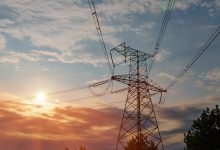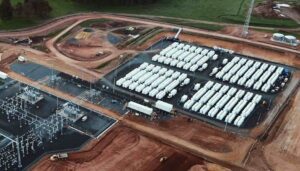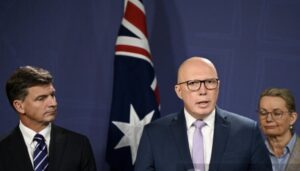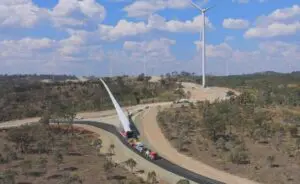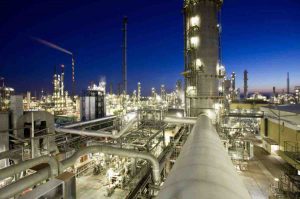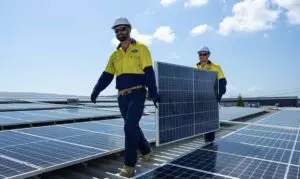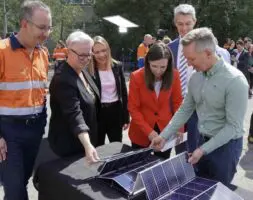The Australian Energy Market Operator has suspended the wholesale electricity spot market across all five participating NEM states, saying it has become “impossible” to operate because of the soaring cost of fossil fuels and generators withholding their capacity from the market.
In a market notice posted on Wednesday afternoon, AEMO said it has suspended the electricity spot market in New South Wales, Queensland, South Australia, Tasmania and Victoria – all five NEM regions – with effect from 2:05pm and until further notice.
AEMO said that it suspended the electricity market because “it has become impossible to operate the sport market in accordance with the provisions of the Rules.”
It is the first time the entire national market has been suspended, although the part of the market was suspended in South Australia in late 2016 in the wake of a state-wide blackout.

The extraordinary move follows the equally unprecedented imposition of a price cap across all the mainland state grids on Monday and Tuesday, and the realisation that it would be impossible to manage because of the high cost of fossil fuel generation.
The suspension means that AEMO’s role in ensuring the lights stay on will – hopefully – be less complicated.
Only one compensation regime, rather than two, will be in place, and generators will get paid the average price in their state over the past four weeks, meaning they are likely to get between $300/MWh and $500/MWh, rather than the flat rate of $300/MWh stipulated in the price cap.
AEMO believes this will be easier to manage. All generators are expected to make themselves available – they can still seek further compensation if the money is not enough to cover their costs.
“In the current situation suspending the market is the best way to ensure a reliable supply of electricity for Australian homes and businesses,” AEMO CEO Daniel Westerman said in a statement.
“The situation in recent days has posed challenges to the entire energy industry, and suspending the market would simplify operations during the significant outages across the energy supply chain.”
In separate statements, New South Wales energy minister Matt Kean and his Queensland counterpart Mick de Brenni, welcomed the intervention.
“This decision will help prevent energy companies from putting energy reliability at risk by unnecessarily withdrawing supply,” Kean said.
“This comes after the Australian Energy Regulator yesterday reminded generators of their obligations under the National Electricity Rules.”
“I expect power companies to do the right thing by their customers and the country.”
The extraordinary situation has been triggered by the soaring cost of coal and gas. Generators who have to purchase coal on the spot market need a price of more than $300/MWh to break even. Gas generators need around $400/MWh.
The price cap was set at $300/MWh as it reflected the cost of the most expensive generation – diesel fuelled generation – and was designed to diffuse a situation where a handful of diesel generators held the market to ransom.
What was not envisaged was a situation where the entire gas generators were holding the market to ransom because their cost of generation was way above the price cap.
More than 7.5GW of capacity has been withdrawn in the last few days as gas generators and other peaking plants waited to be directed by market operators to supply power, so they could claim maximum compensation.
To add to the problem, a large number of generation units have been out of action for planned maintenance, including 3,000MW of coal capacity that is out of action due to unplanned events. There was also lower transmission capacity due to works, and lower wind and solar output, along with high demand.
RenewEconomy has been told that although forced outages – known as load shedding – had been avoided in the last few days, AEMO had little confidence that it could continue to avoid them, particularly as the price cap was likely to be in place for many weeks.
Apparently, the whole system had begun to break down, with AEMO being informed by some generators that they could not operate when instructed because they did not have any fuel, or would find it hard to access.
The situation in the NEM highlights the vulnerability of a grid still heavily dependent on fossil fuels, and where the price of these commodities is often set by international markets.
The so-called “gas-led recovery” is now being branded as the “gas-led catastrophe”, and the only long term solution to it is the quick transition to renewables that had been resisted by the federal Coalition for the past decade.
However, that transition is complicated by delays in transmission infrastructure, the failure to write new rules for the market, and now a global supply crunch that is making it difficult to supply key materials, such as battery cells and other key components for wind and solar farms.
The announcement by AEMO came after a crisis meeting of energy ministers, energy companies, and market bodies on Wednesday.
Regulators had earlier expressed their frustration, pointing out to generators that their decision to withhold capacity in order to attract a direction was both illegal and subject to heavy fines in the millions of dollars.
But they also conceded that the compensation regimes – one operating under the price cap, and another for “directions” – was complex, confusing and creating irrational behaviour.
In effect, for the first time, they admitted that the rules designed for a fossil fuel grid more than 20 years ago are no longer fit for purpose, and no longer manageable to maintain supply. “It has all broken down,” said one insider.
NSW energy minister Matt Kean also expressed his frustration, noting the reminders from regulators to the power companies about obeying the rules.
“I expect power companies to do the right thing by their customers and the country,” he said in a statement.
See also: Dumb and illegal: Regulators read the riot act to striking generators
And: The day the fossil fuel industry lost all perspective, and threw away its social licence

